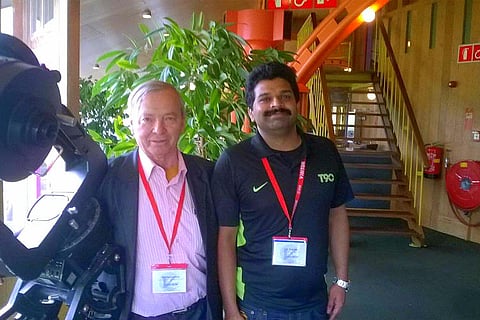

By Aswin Sekhar
I think I was about six years old when I first heard the word 'Dhoomakethu' during a conversation between one of my wise uncles and my grandparents at our ancestral home in a small village in Palghat, Kerala. My uncle used to work as a scientist at Keltron, Trivandrum those days and people in our family used to listen to his astronomy hobbies with great interest.
From my vague recollection, this conversation was something about the famed Halley’s comet and its capability of producing meteor showers on Earth.
Most of the intricate details from this overheard conversation disappeared from my brain instantly but this one exotic word 'dhoomakethu' lingered in my brain ever since childhood. Days, years and decades flew fast and taking inspiration from such conversations plus thanks to generous helpings of good luck, I grew to become a professional astronomer in the field of comets and meteor showers.
Various interactions over the last decade with many top scientists in the field of solar system astronomy gave me a chance to learn many fascinating things about comets and meteor showers.
I came to know that the present popular theory of comet was first put forward by an acclaimed American astronomer Fred Whipple in early 1950s from Harvard Observatory. His theory says comet is a mixture of dust, pieces of rock and ice, which starts outgassing due to sublimation when the comet comes close to the sun and thereby producing meteor showers on Earth when these outgassed dust particles from the comet reach one of the Earth’s nodal points in the orbit.
The most interesting aspect of our ancient native word for comet 'dhoomakethu' is that it is a collection of words which means rock/dust and nodal points in orbit i.e. the term 'dhoom' directly means rock/dust part and the term 'kethu' directly indicates nodal point in orbit.
"In more general terms, the words 'dhoom' and 'dhooma' stand for 'sputter/blast' and 'smoke/vapour' respectively which also neatly overlap with the modern theory of the outgassing of comets. In Sanskrit, 'dhooma' is the word for smoke (like in Dhoomapana for smoking). 'ketu' means flag or banner. In Sanskrit texts, meteor as well as comet are referred as 'Dhoomakethu'."
Although celestial mechanics legends like Newton and Halley had a fair idea, centuries ago, about the orbits and trajectories of comets through the solar system, a detailed understanding of the internal physical processes and composition of comets and their direct role in producing meteor showers on different planets is more recent (i.e. 1950s and later on) in the history of modern astrophysics.
The recent and highly successful Rosetta mission (which ended last year) to land on comet 67P/Churyumov-Gerasimenko, which was envisaged and launched by European Space Agency (ESA) was purely dedicated to the study of comets. This is a good example of man’s continuing efforts to understand more about these mysterious bodies in space.
Image of comet 67P/Churyumov-Gerasimenko taken by ESA’s Rosetta Mission which shows the outgassing from ices and dusty plus rocky nature of this comet. (Image credit: ESA/Rosetta Team)
During a conference on Meteoroids last year, organised by International Astronomical Union at ESA HQ, I had the privilege of meeting the Ukrainian astronomer Dr K Churyumov, the ace co-discoverer of this Rosetta mission target 67P/Churyumov-Gerasimenko, a comet which is named in his honour.
During the conference, he asked me where I was from and what is the native word for comets in my language. I told him that I was from India and mentioned that our native word 'dhoomakethu' for comet is a collection of words which meant rock/dust and nodal points in orbits. Hearing this, he exclaimed 'Wow' and was truly surprised and impressed when I explained more about this word coined by our ancestors long back.
I felt a subtle sense of pride that our wise ancestors in India had such remarkable insight and knowledge in comets even during ancient times that they gave this class of solar system bodies such a perfect and logical name. I can clearly imagine there are numerous examples like these and this is just the tip of an iceberg of rich scientific history and heritage we have inherited from our wise ancestors who observed the sky with great passion and detail.
In future, more science based historical studies in India may help us to unravel even more pristine examples from our language and culture correlating the modern scientific theories in astrophysics so elegantly.
(Sadly the ace comet observer Dr K Churyumov left the living world few months back and this article is written in memory of his 'honest expression of wow' and his appreciation while hearing the meaning of the ancient word 'dhoomakethu').
(The author, Dr Aswin Sekhar, works as a research scientist at Centre for Earth Evolution and Dynamics, Faculty of Mathematics and Natural Sciences, University of Oslo, Norway)